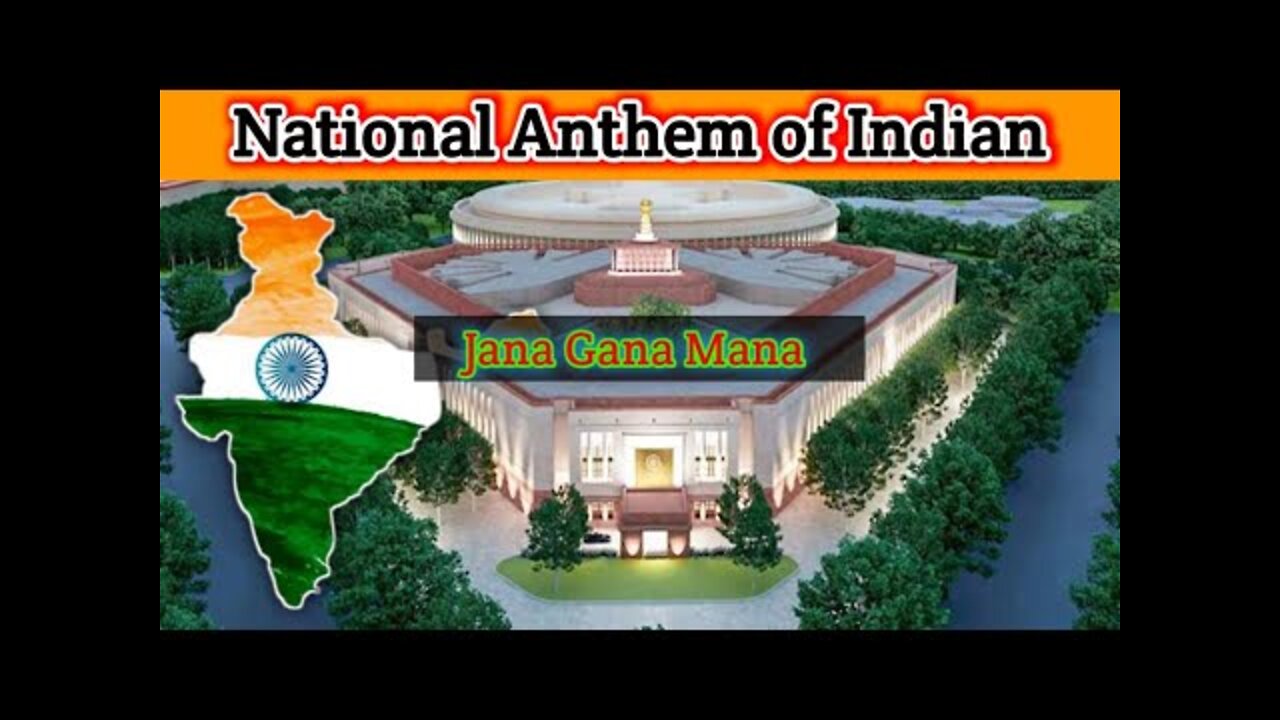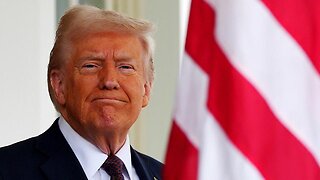Premium Only Content

National Anthem Of India Jana Gana Mana Full Song
The National Anthem of India is titled ‘Jana Gana Mana’. The song was originally composed in Bengali by India’s first Nobel laureate Rabindranath Tagore on December 11, 1911. The parent song, ‘Bharoto Bhagyo Bidhata’ is a Brahmo hymn which has five verses and only the first verse has been adopted as National Anthem. If put forward succinctly, the National Anthem conveys the spirit of pluralism or in more popular term the concept of ‘Unity in Diversity’, which lies at the core of India’s cultural heritage.
The lyrics of the song first appeared in 5 stanzas in Bengali magazine in an issue of Tatwabodhini patrika. The melody of the song, in raga Alhaiya Bilawal, was composed as a Brahmo Hymn by Tagore himself with possibly some help from his musician grand-nephew Dinendranath Tagore. The final form of the song before the first public performance was set on December 11, 1911.[20][7][21]
The song was first publicly sung on the second day of the annual session of the Indian National Congress in Calcutta (now Kolkata) on 27 December 1911. Then, it was followed in January 1912 at the annual event of the Adi Brahmo Samaj,[22][23] however, it was largely unknown except to the readers of the Adi Brahmo Samaj journal, Tattwabodhini Patrika. The poem was published in January 1912, under the title Bharat Bhagya Bidhata in the Tatwabodhini Patrika, which was the official publication of the Brahmo Samaj with Tagore then the Editor.[24]
In 1912, the song was performed by Sarala Devi Chaudhurani, Tagore's niece, along with the group of school students, in front of prominent Congress members like Bishan Narayan Dhar, Indian National Congress President, and Ambika Charan Majumdar.[25]
In 1917, the song was again performed in Congress conference and this time in aid of instrumental music by the Mahraja Bahadur of Nattore. [26]
Outside of Calcutta, the song was first sung by the bard himself at a session in Besant Theosophical College in Madanapalle, Andhra Pradesh on 28 February 1919 when Tagore visited the college and sung the song. The song enthralled the college students and Margaret Cousins, then vice-principal of the college (also an expert in European music and wife of Irish poet Dr. James Cousins). Based on the notes provided by Tagore himself, the song was preserved in 1919 in western notation at Madanapalle of Andhra Pradesh by Mrs. Margaret Cousins and her students.
The whole episode was recorded by Dr.Cousins in his autobiography "We Two together":[9]
In a voice surprisingly light for so large a man, he sang something like a piece of geography giving a list of countries, mountains and rivers; and in the second verse, a list of the religions in India. The refrain to the first made us pick up our ears. The refrain to the second verse made us clear our throats. We asked for it again and again, and before long we were singing it with gusto: Jaya hai, Jaya hai, Jaya hai, Jaya JayaJayaJaya hai (Victory, victory, victory to thee). We had no idea who or what was to have the victory. The next day Rabindranath gave the swarams(notes) of "Jana gana" to Mrs.Cousins so that the melody should have accurate permanent record. He also made the translation of the song into English as 'The Morning Song of India'.
And thus, Mrs. Cousins became probably the first person to transcribe and preserve Tagore's composition in western sheet music notation at Madanapalle based on the notes provided by Tagore himself. And soon it took its place in the 'daily deciation' of the combined school and college of Besant Hall in Madanapalle and is still sung to this date. It was also here that the song was first translated into English by Tagore as 'The Morning song of India'. [9]
These notations are largely followed to this day, although several subsequent reinterpretations have been made. The official National Anthem today is usually performed in the orchestral/choral adaptation made by the English composer Herbert Murrill at the behest of Nehru.[8] Other interpretations include the B.L. Mukherjee and Ambik Mazumdar interpretation that was played in Germany for the first time under Netaji as the national anthem of India, as well as the interpretation of Ram Singh Thakuri for its INA translation to hindustani as 'sab sukh chain'
The song was selected as national anthem by Subhas Chandra Bose while he was in Germany. On the occasion of the founding meeting of the German-Indian Society on 11 September 1942 in the Hotel Atlantic in Hamburg, Jana Gana Mana was played for the first time by the Hamburg Radio Symphony Orchestra as the national anthem of an independent India.[28]
Before it officially became the national anthem of India in 1950, "Jana Gana Mana" was heard in the 1945 film Hamrahi.[29] It was also adopted as a school song of The Doon School, Dehradun in 1935.[30]
On the occasion of India attaining freedom, the Indian Constituent Assembly assembled for the first time as a sovereign body on 14 August 1947, midnight and the session closed with a unanimous performance of Jana Gana Mana.
The members of the Indian Delegation to the General Assembly of the United Nations held at New York in 1947 gave a recording of Jana Gana Mana as the country's national anthem. The song was played by the house orchestra in front of a gathering consisting of representatives from all over the world.
-------------------
English Transiate
Thou art the ruler of the minds of all people,
Dispenser of India's destiny.
Thy name rouses the hearts of the Punjab,
Sind, Gujarat, and Maratha,
Of the Dravid, and Orissa and Bengal.
It echoes in the hills of Vindhyas and,
Himalayas, mingles in the music of the
Jamuna and the Ganges and is chanted by
the waves of the Indian sea.
The pray for the blessings,
and sing by the praise,
The saving of all people
waits in thy hand.
Thou dispenser of India's destiny,
Victory, victory, victory to thee.
------------------
#IndianNationalAnthem #RavindranathTagore #JanaGanaMana #FullNationalAnthem
#ViralVideo #LongLiveIndianIndependence
#MusicIndiaEntertainment #JanaGanaMana #NationalAnthem #SwagatalakshmiDasgupta #IndipandenceDaySong #RepublicDaySongs #GandhiJayantiSongs #PatrioticSong #HindiPatrioticSongs #BengaliPatrioticSongs #DeshBhaktiGeet #IndianArmySong
-
 LIVE
LIVE
TimcastIRL
2 hours agoLIVE: Trump Joint Presidential Address, IRS To Fire 45,000 Staff w/Rachel Wilson | Timcast IRL
39,361 watching -
 LIVE
LIVE
Redacted News
59 minutes agoLIVE: Renewal of the American Dream | Donald Trump Addresses Joint Session of Congress | Redacted
7,298 watching -
 LIVE
LIVE
vivafrei
8 hours agoDonald Trump to Address Congress! Viva Frei LIVE WITH COMMENTARY!
4,832 watching -
 LIVE
LIVE
Right Side Broadcasting Network
4 days agoLIVE: President Trump Addresses a Joint Session of Congress - 3/4/25
96,508 watching -
 LIVE
LIVE
The Charlie Kirk Show
1 hour agoTHOUGHTCRIME - The Renewal of the American Dream Speech Special
8,292 watching -
 DVR
DVR
Kim Iversen
4 hours agoRFK Jr: Antisemitism Is a 'Health Threat' | Pam Bondi: Epstein Files Will Be Redacted For National Security??!
35.7K23 -
 LIVE
LIVE
Candace Show Podcast
2 hours agoWatch With Me: President Trump’s Address To Congress
3,533 watching -
 LIVE
LIVE
Benny Johnson
6 hours ago🚨President Trump's State of the Union Speech LIVE Right Now! We're INSIDE US Capitol, Special Guests
25,192 watching -
 LIVE
LIVE
Barry Cunningham
21 hours agoPRESIDENT TRUMP SPEECH ADDRESS TO JOINT SESSION OF CONGRESS | INTERVIEWS ALL DAY!
2,346 watching -
 LIVE
LIVE
Drew Hernandez
18 hours agoWATCH PARTY: PRESIDENT TRUMP'S JOINT ADDRESS TO CONGRESS
1,365 watching